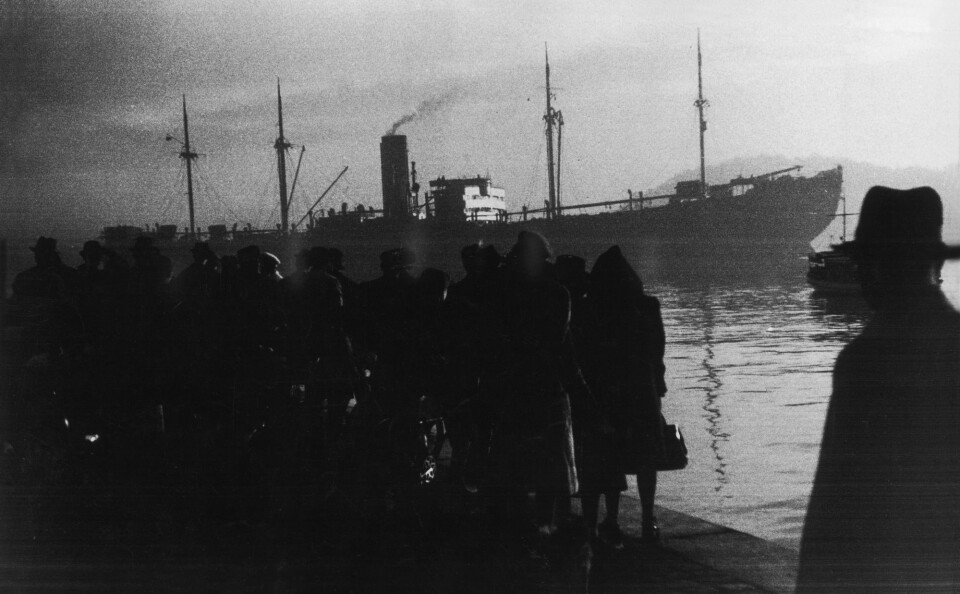
As Norwegian Jews were being deported, the Quisling government discussed working hours during the Christmas holidays
On the darkest day in Norwegian history, the government discussed very trival matters, new research shows.
A total of 529 Norwegian Jews were deported and sent to concentration camps on the German transport ship "Donau" on Thursday, November 26, 1942.
The night before, police had raided homes to round up Jewish women and children. Jewish men had been arrested earlier in the autumn.
At the regular intergovernmental conference held every Thursday by Quisling’s National Government, the intent was to pass a law on Jews.
But that particular day, the case was put aside.
Most of the Jews in Norway were already on their way out of the Oslo Fjord. Five days later they arrived at Auschwitz. Only nine survived.
“The law was brutally overrun by history. It became superfluous,” says Øystein Sørensen, a historian at the University of Oslo. Sørensen recently presented his research at the Norwegian Academy of Science and Letters in Oslo.

Sørensen is working on an academic article on the National Socialist regime in Norway and the Jews. As part of his research he has looked at what issues were being discussed at the government meeting around 2 p.m. on this dark day in Norwegian history.
Among the issues that were discussed were working hours in government offices during the upcoming Christmas and New Year holidays. And that there was a new customs treasurer in Drammen.
They had a moral responsibility
Anti-Semitism was an important and integral part of the ideological foundation of the National Socialist Party, or NS, Sørensen says.
There is disagreement however regarding whether or not the party and Quisling knew what was to happen to the Jews once deported.
“There is no doubt that the NS regime and those who actively supported it had a moral co-responsibility for the fate of the Norwegian Jews during the Second World War, regardless of what each individual NS member knew about the fate of the Jews,” says Sørensen.
The 1934 NS programme contained nothing about Jews. But since the party was governed by the leader principle (Führerprinzip), the official party view was to be found in Vidkun Quisling's speeches and articles.
These sources paint a picture of a racially based anti-Semitism with significant conspiratorial elements, says Sørensen.
Trusted that Hitler would find a solution
Most programmatic is the lecture Quisling held at a conference in Frankfurt in March 1941. There he painted a broad picture of a Jewish-inspired world conspiracy that opposed European civilization.
Judaism's goal was to break down the other national natural organizations. This made it necessary to resolve what Quisling called the "Jewish problem".
He specifically called for common legislation on Jews in German-dominated Europe, following the pattern of the German Nuremberg Laws. This legislation would prohibit racial mixing and deny Jews citizenship rights.
His speech also addressed what could be done with the Jews. When the Jewish question could not be resolved by exterminating the Jews, "their parasitic existence must be prevented from getting their own land," he said. But this could not be Palestine, he believed, because it had become the land of the Arabs.
He had no other concrete suggestions and said in his speech that he had full confidence that Hitler would find "practical solutions".
Preferably a separate island
Between March 1941 and December 1942, the Soviet Union and the United States had entered the war and became Germany's enemies. Quisling had formed a government in Norway and in November, 529 Jews were deported.
Quisling continued with his aggressive approach when he gave a speech in Trondheim in December of the same year. The Jews were still the great enemy, and now Quisling could also link them to Stalin.
"Today it is the Jews who make decisions in the United States, England and the Soviet Union," he argued.
His solution was to have them removed from Europe for good. This was an ideological justification for deportation and to continue to deport the Jews who still remained in Norway.
He believed that the only solution was for the Jews to leave Europe and go to another part of the world, preferably an island.
Race biology shows up
Quisling wanted to demonstrate to Hitler that the NS had full control and could handle Norway on its own — even when it came to the Jewish question, says Sørensen.
After February 1, 1942, more systematic efforts were made to create legislation against the Jews. In the autumn of 1942 came the Mandatory Reporting Act and the law on the confiscation of Jewish fortunes.
The Mandatory Reporting Act provided an expanded definition of Jews. It included what the NS called full Jews, half Jews and quarter Jews. This law was more extensive than Nazi Germany's Nuremberg Laws.
“This must be seen in the context of the sharp escalation of anti-Semitism in the NS in the autumn of 1942,” said Sørensen.
A lesser-known law, which was never implemented, was intended to be the great and overarching law covering Jews, a Norwegian Nuremberg Law. There is little historical material about this, but it is extremely interesting and important, Sørensen said.
A draft of this law from the Ministry of the Interior was dealt with in the Ministry of Justice and thoroughly trounced. The Ministry of Justice strongly criticized the Interior Ministry's proposals.
Two types of anti-Semitism?
The Ministry of Justice believed that the bill went too far both in terms of who the law should encompass and the many discriminatory measures that would affect Jews. They drafted a somewhat more moderate alternative bill.
But the law was never adopted — it became superfluous after the Jews were deported from Norway on November 26th, 1942.
Historian Hans Fredrik Dahl has said that he believed that there were two types of anti-Semitism expressed in Norway at this time, with their roots in two different places.
Ancient anti-Semitism was about an old religious understanding of Jewish mentality. The newer view was in keeping with the National Assembly's understanding that Jews were defined by biological criteria.
The racial biological understanding of Jews created major problems for lawyers in NS Norway and also in Nazi Germany. How could you define what was a Jew in a law? This became difficult for at least some of them, says Sørensen.
Norwegian lawyers were loyal
There is little evidence that Jewish persecution was prosecuted in Norway, unlike in Germany, says Hans Petter Graver. He is a professor of law at the University of Oslo and has studied judges who have to enforce oppressive and authoritarian legislation.
As early as 1936 there was a frightening portent as to what would happen in Germany.
Through the law and courts, the Jews were systematically pushed out of positions as rights holders in society.
However, when this did not happen in Norway, it was probably not due to a lack of ideology, but a lack of judicial conflicts over the origin of the Jewish question.
And when case law could have been relevant, the Jews had already been deported.
NS got the legal advice they needed, says Graver. He has found only one legal protest regarding the deportation of the Jews.
———































